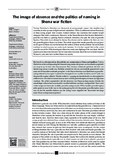Please use this identifier to cite or link to this item:
https://cris.library.msu.ac.zw//handle/11408/817| Title: | The image of absence and the politics of naming in Shona war fiction | Authors: | Chigidi, Willie L. Mutasa, Davie E. |
Keywords: | Shona war fiction Liberation war |
Issue Date: | 2013 | Publisher: | AOSIS | Series/Report no.: | Literator;Vol. 34 (1) | Abstract: | During Zimbabwe’s liberation war thousands of young people crossed into neighbouring countries to take up arms to fight and end colonialism. There is sufficient evidence that many of these young people were women. Political rhetoric also maintains that women fought alongside their male counterparts. However, in the Shona literature that depicts Zimbabwe’s guerrilla war there is a glaring absence of female characters who play the roles of guerrilla fighters. This article is an attempt to discuss this absence and to explain why there are very few guerrilla girls in Shona war fiction. The article argues that female guerrillas are not given much space in Shona war novels because the writers of these novels continue the oral folktale tradition in which women are rarely made heroines. It is further argued that in the actual guerrilla war of the 1970s female guerrillas were rarely seen fighting at the war front, that the pioneer guerrillas were men and that the masculine discourse about the war excluded women. Moreover, only men have written Shona war novels. | URI: | http://hdl.handle.net/11408/817 | ISSN: | 0258-2279 |
| Appears in Collections: | Research Papers |
Files in This Item:
| File | Description | Size | Format | |
|---|---|---|---|---|
| Guerrilla girls.pdf | 649.46 kB | Adobe PDF |  View/Open |
Page view(s)
176
checked on Feb 15, 2026
Download(s)
30
checked on Feb 15, 2026
Google ScholarTM
Check
Items in MSUIR are protected by copyright, with all rights reserved, unless otherwise indicated.



